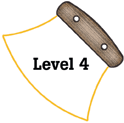
Alaska Science
Key Element C5
A student who meets the content standard should understand that sharing scientific discoveries is important to influencing individuals and society and in advancing scientific knowledge.
 |
Alaska Science A student who meets the content standard should understand that sharing scientific discoveries is important to influencing individuals and society and in advancing scientific knowledge. |
|
Performance Standard Level 4, Ages 15–18
|
|
|
|
Sample Assessment Ideas
|
|
|
Expanded Sample Assessment Idea
|
|
Procedure Students will:
Reflection and Revision
|
Levels of Performance |
||
|
Stage 4 |
Landfill design and justification documents are complete, detailed and show evidence of elaboration, extension, higher-order thinking skills and relevant knowledge. | ||
|
Stage 3
|
Landfill design and justification documents are complete and clearly expressed although minor inaccuracies, omissions or inappropriateness may also be evident. | ||
|
Stage 2
|
Landfill design and justification documents may contain some elements of proficient work but may be incomplete, inaccurate, or inappropriate for the locale. | ||
|
Stage 1
|
Landfill design is incomplete, inaccurate or inappropriate for the locale. Justification documents, if included, lack detail and contain little evidence of relevant knowledge. | ||
Standards Cross-References
|
||
|
National Science Education Standards Communicate and defend a scientific argument. Students in school science programs should develop the abilities associated with accurate and effective communication. These include writing and following procedures, expressing concepts, reviewing information, summarizing data, using language appropriately, developing diagrams and charts, explaining statistical analysis, speaking clearly and logically, constructing a reasoned argument, and responding appropriately to critical comments. (Page 176) Results of scientific inquiry-new knowledge and methods-emerge from different types of investigations and public communication among scientists. In communicating and defending the results of scientific inquiry, arguments must be logical and demonstrate connections between natural phenomena, investigations, and the historical body of scientific knowledge. In addition, the methods and procedures that scientists used to obtain evidence must be clearly reported to enhance opportunities for further investigation. (Page 176) Scientists have ethical traditions. Scientists value peer review, truthful reporting about the methods and outcomes of investigations, and making public the results of work. Violations of such norms do occur, but scientists responsible for such violations are censured by their peers. (Page 200) Usually changes in science occur as small modifications in extant knowledge. The daily work of science and engineering results in incremental advances in our understanding of the world and our ability to meet human needs and aspirations. Much can be learned about the internal workings of science and the nature of science from study of individual scientists, their daily work, and their efforts to advance scientific knowledge in their area of study. (Page 201) |
Benchmarks Scientists in any one research group tend to see things alike, so even groups of scientists may have trouble being entirely objective about their methods and findings. For that reason, scientific teams are expected to seek out the possible sources of bias in the design of their investigations and in their data analysis. Checking each other’s results and explanations helps, but that is no guarantee against bias. (Page 13) New ideas in science are limited by the context in which they are conceived; are often rejected by the scientific establishment; sometimes spring from unexpected findings; and usually grow slowly, through contributions from many investigators. (Page 13) |
|
Table of Contents | Return to Alaska Native Knowledge Network